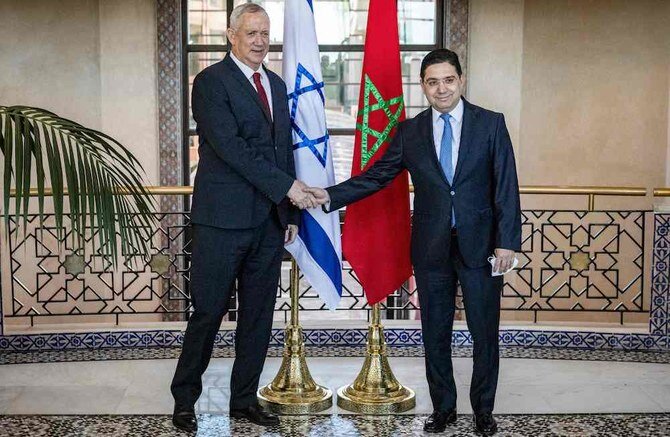Palestinians condemn Morocco-Israel security cooperation agreement

TEHRAN - The Executive Committee of the Palestine Liberation Organization (PLO) today condemned the recently signed agreement between Israel and Morocco that lays the foundation for security cooperation, intelligence sharing, and future arms sales.
Palestinians have strongly condemned an agreement that lays the foundation for security cooperation, intelligence sharing, and future arms sales between Israel and Morocco, with neighboring Algeria blasting the deal and calling Rabat’s threats "unprecedented and disgraceful.”
“The agreement between Morocco and Israel will jeopardize regional security, and will give the occupying regime the opportunity to escalate their attacks against the Palestinian nation, and to infringe upon the security of African people,” Sami Abu Zuhri, a spokesman for Hamas resistance movement, wrote in a post published on his Twitter page on Friday.
He called on Moroccan authorities to reverse the dangerous move.
Morocco and Israel signed the "security cooperation agreement" on Wednesday during a ceremony attended by Israeli minister of military affairs Benny Gantz and Moroccan Defense Minister Abdellatif Loudiyi in Rabat.
Hamas condemned Gantz's Morocco trip, saying in a statement that, "Normalizing ties with the occupation is a stab in the back of the Palestinian people that encourages it to go ahead with crimes and violations against Palestinians."
The Palestine Liberation Organization (PLO) Executive Committee also denounced formalization of security cooperation between the North African state and the Tel Aviv regime.
“We hoped that the Kingdom of Morocco, which chairs the al-Quds Committee, would not take this dangerous step in light of the racist measures practiced by Israel against Palestinian people, its disregard of all peace agreements, its rejection of negotiations and the [so-called] two-state solution, and its imposition of a fait accompli policy,” it said in a statement.
The statement highlighted that Israel’s “continued illegal settlement expansion policy, forced displacement of occupied al-Quds residents, gradual annexation of Palestinian lands, and prejudice against the Arab and Islamic identity of al-Quds and its sanctities” were reasons why Morocco should not have signed the agreement.
“This agreement constitutes a departure from what has been stipulated in the Arab League summits, the Arab consensus, and the Arab Peace Initiative,” the PLO Executive Committee pointed out, adding that the agreement is “harmful to the security and interests of Arab nations.”
It also urged Morocco to cancel the agreement, emphasizing that any departure by an Arab country from the Arab Peace Initiative is unacceptable and offers a reward to the Israeli regime.
The so-called Arab Peace Initiative, which was proposed by Saudi Arabia, calls on Israel to agree to a Palestinian state along the 1967 lines and a “just” solution to the Palestinian refugee issue.
Algerian President Abdelmadjid Tebboune deplored security cooperation between Morocco and Israel, and termed Rabat’s threats against his country as unprecedented and disgraceful.
“Morocco’s threats against Algeria are an absolute disgrace, as there has not been such a thing since 1948,” Russia’s RT Arabic television news network quoted Tebboune as telling reporters in Algiers on Friday evening.
He added, “We will retaliate against anyone who dares to attack us. An eye for an eye and a tooth for a tooth.”
A top Algerian official said on Thursday that Gantz's visit to Morocco had “targeted” his country.
“The enemies are mobilizing more and more to undermine Algeria,” Senate president Salah Goudjil said in a statement.
Israel and Morocco agreed on December 10, 2020 to normalize relations in a deal brokered with the help of Trump’s administration, making the North African country the fourth Arab state last year to strike a normalization deal with the regime. The others were the United Arab Emirates, Bahrain and Sudan.
Former US president Donald Trump sealed the agreement in a phone call with Morocco’s King Mohammed VI. As part of the agreement, the US president agreed to recognize Morocco’s sovereignty over the Western Sahara region, which has been at the center of a dispute with neighboring Algeria.
Algeria cut diplomatic ties with Morocco in August, citing “hostile actions.”
The Algerian Foreign Ministry later rejected Trump’s stance, saying the US decision “has no legal effect because it contradicts UN resolutions, especially UN Security Council resolutions on Western Sahara.”
The Algeria-backed and pro-independence Polisario Front has also rejected “in the strongest terms” Trump’s stance on the disputed Western Sahara Desert region, stating that the former US president attempted to give to Morocco “that which does not belong to it.”
The agreement with Israel also drew condemnation from the Palestinians.
